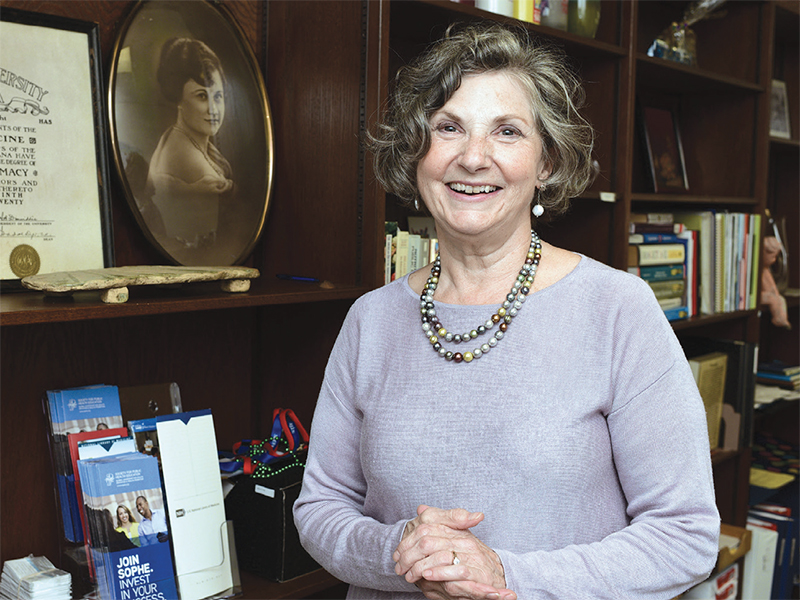Tulane librarian named one of Library Journal's 2021 Librarians of the Year

Librarian Elaine R. Hicks of Tulane University’s Rudolph Matas Library was named one of three Librarians of the Year by Library Journal (LJ), one of the oldest and most respected publications covering the library field, for her work helping the World Health Organization manage the flood of COVID-19 information by founding the Librarian Reserve Corps.
In response to the World Health Organization's (WHO) need for timely, accurate, and searchable material about COVID-19, Elaine R. Hicks—research, education, and public health librarian at Tulane’s Rudolph Matas Library —pulled together an ad hoc organization she named the Librarian Reserve Corps (LRC). Among those who answered her call for volunteers were Stacy Brody, reference and instruction librarian at the George Washington University (GWU) School of Medicine and Health Sciences in Bethesda, MD; and Sara Loree, medical librarian at St. Luke's Health System, Boise, ID, both of whom soon stepped up to serve as the project's co-leads. Both Brody and Loree have also been named Librarians of the Year for their roles as co-leads in the LRC.
The LRC is an all-volunteer-led group founded in March 2020 providing critical librarian time, skills, and resources to the growing need for quality information in swift emergency response to the global pandemic. LRC has volunteers around the globe collaborating with health and library science professionals in these efforts. LRC volunteers provide a variety of expertise and skillsets critical to this work, from comprehensive literature searching to indexing to partnership building.
Since March of 2020, LRC has vetted, indexed, and helped disseminate tens of thousands of health resources about the SARS- CoV-2 novel coronavirus with about 130 librarians from the United States, Canada, Germany, Australia, and Trinidad.
The Librarian of the Year award, sponsored by Baker & Taylor, honors librarians for outstanding achievement and accomplishments reflecting the loftiest service goals of the library profession. These include: free access to information for all; encouragement of reading; enhancement and expansion of library service to all areas and constituencies in the community; and strengthening the library role and position in the community. Hicks, Brody, and Loree will be profiled in LJ’s January issue in “Battling the Infodemic: LJ’s 2021 Librarians of the Year,” and will speak at LJ’s free Virtual Summit, Building the Next Normal, on February 23, addressing how librarians can fight pandemic misinformation and help their users make lifesaving choices.
“Hicks, Brody, Loree, and their team of librarian volunteers exemplify the impressive pandemic response we have seen from the whole library profession,” said Meredith Schwartz, Editor-in-Chief of Library Journal. “From constructing PPE on library Maker space 3-D printers and sewing machines, to getting families digitally connected to school and work by loaning devices and setting up Wi-Fi on bookmobiles and in library parking lots, to delivering story times by telephone and books by drone, library workers have gone above and beyond to make sure libraries remain a lifeline even through closed buildings and social distance. What makes our Librarians of the Year stand out, even in such company, is that they used their core librarianship information wrangling skills to literally help save lives.”
“This award …. affirms to the library, community informatics, and information science communities that our skills are a vital part of emergency response,” said Hicks. “For academic libraries, it says VALUE to university schools and departments; for public libraries, it is an example of how a library can contribute to a local emergency/disaster response; and school librarians may see a role for them in the school’s preparedness plans.”
All three of Library Journal's 2021 Librarians of the Year agree that the pandemic response has shone a spotlight on the need for sophisticated treatment of information—which isn't going to disappear with the development of an effective vaccine. The emerging WHO field of infodemiology—the study of user- contributed health-related electronic content, with a focus on improving public health—will likely offer new opportunities for information professionals in public libraries as well as those in the academic or health science spheres.
"Information and public health have the spotlight on them now, which is a real shot in the arm for people in both of these occupations," says Hicks. "Look at how fast people are learning, responding, changing, and being open to new ways of doing things. In this case it's a pandemic, but it could have been anything that so shocked all of our systems and our societies—and in this case created opportunity." LRC is still taking volunteers; anyone interested can sign up at https://librarianreservecorps.libguides.com/home/getinvolved.
